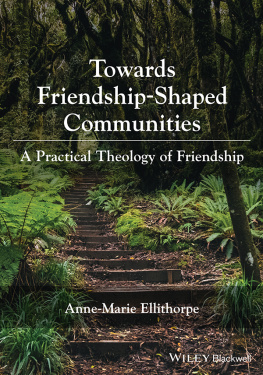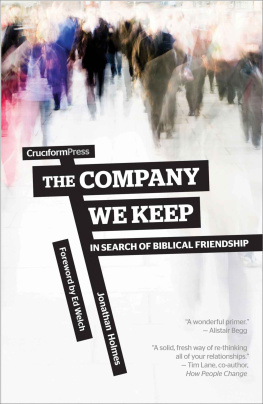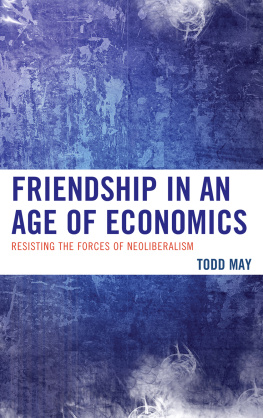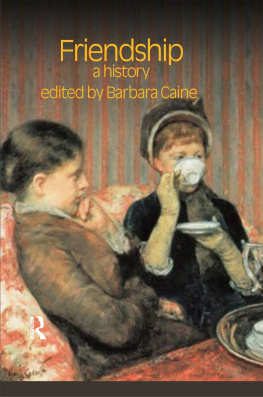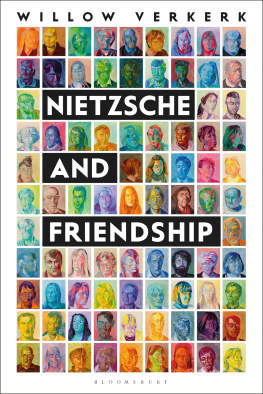Conclusion
This book has investigated the relationship of friendship from the perspective of practical theology, with specific consideration given to practices and to the social and theological imagination. My research affirms friendship as a theologically rich relationship with multigenerational impact, and advocates for transformative friendship-shaped communities characterized by relationships of reciprocity, compassion, and active friendship. While friendship has been trivialized, it is not a trivial relationship. Rather, it is a relationship of ethical significance, with public, political, and spiritual dimensions.
Willie Jennings describes friendships as forming on a social fabric before they create a fabric. Although this fabric may be deformed, it may also be remade, as people listen to and learn from one another and pursue social justice. Thus, attention must be paid to the warp and weft of social fabric, including the interrelationship of God, land, and people, as well as to friendships themselves.
Indigenous understandings of relationality and friendship are interwoven with kinship concepts. In a number of contexts, Aotearoa New Zealand and Canada among them, treaties between Indigenous people and the leadership of the colonizing empire were understood to be treaties of covenantal friendship, creating kin-like relationships. The injustices of colonization, which include ignoring or dishonoring friendship treaties, have, however, deformed the social fabric. Unequal power relations and abuse of power have negatively affected friendship between nations, communities, and individuals for multiple generations. Nevertheless, practices of personal and civic friendship have contributed to a whakapapa (genealogy) of nonviolent resistance to oppression and have provided at least some examples of coexistence with, commitment to, and compassion for the other.
Resistance to oppression is encouraged throughout the biblical texts; friendship is inherent to key aspects of these texts. Human beings are called into relationships of mutuality with others, creation, and God, and to image a befriending God: a life of friendship with God demands fidelity to the ways of God. Although the term civic friendship is not used in the scriptures, relationships characterized by goodwill towards and action on behalf of the other are integral to the social fabric of covenantal community. As the covenant community images God in promoting justice, they are to extend personalpublic friendship through empathy, affection expressed in action, and the honoring of those who are other, as well as through the pursuit of balanced reciprocity. The opening genealogy of Matthews gospel, which points back to the First Testament, indicates the potential for acts of friendship and compassion to positively impact subsequent generations. In the Second Testament, Jesus models open friendship and calls for creative responses to oppression, making space for the restoration of justice despite asymmetrical power relationships. Jesus demonstrates what it means to lay down ones life for ones friends in ongoing accompaniment. Further on in the Second Testament, friendship is inherent to Pauls call for reconciliation.
In the writings of the classical philosophers, friendship is depicted as necessary to life (for men of status, at least) and friendly civic relations are explicitly identified as essential to any good society. While these philosophers wrote from a place of relative privilege and do not show the same concern for resistance to oppression, Aristotle emphasizes that friendship is indispensable to genuine justice.
Subsequent Christian writings upheld the importance of friendship, recognized the interrelationship of friendship and community, affirmed the appropriateness of speaking of friendship with God, and acknowledged friendship as sacramental and eschatological. While friendship has been a minor theme within Christian traditions, friendship was a significant consideration for some of the most important Christian thinkers.
Yet friendship became disconnected and isolated from community life in many Euro-Western contexts. Friendship was sentimentalized as a private relationship and pushed from the public square. As the concept and practice of civic friendship was neglected, the paternalistic and racist attitudes of colonization distorted and deformed social fabric.
Currently, neoliberalism presents obstacles to various forms of friendship and is yet another form of colonization to be resisted. Where human beings have settled for a reduced view of reality and a relationally impoverished way of life, an alternative stance to the cosmos, to communities, and to one another is needed. Friendship, broadly construed and enriched by Indigenous, biblical, theological, and philosophical insights, provides an alternative stance. There is potential for a Christian metaphysical vision of friendship to reveal the broader reality that envelops and informs friendships and communities.
Three sets of dynamically interrelated relationships, between God, people, and land, constitute who we are; a holistic understanding of friendship acknowledges the interplay of these various dimensions of relationality. Friendship is integral to being human, and relevant to God, to human relationship with God, and to life within broader communities as it fosters concern for the common good. Thus, this multidimensional formative relationship is not opposed to the neighbor-love encouraged within the scriptures.
Rather, personal friendship is a school of love, fostering equal regard and reciprocal self-giving, nurturing broader commitments through the willing of good for God and for others, and relevant throughout varying stages of life. As such, personal friendship is also a school contributing to civic friendship. Spirit-shaped friendships and friendship-shaped communities have the potential to reflect the character of God, and are used by the Spirit to shape human beings in the way of Jesus. Authentic friendship nurtures practices of compassion, wisdom, freedom, and hospitality. Spirit-shaped friendships are schools of hospitality, freedom, and wisdom; friendship-shaped communities nurture compassion and justice.
Friendships shaped by the Spirit reflect something of the life-giving, radically inclusive, and liberating nature of the Spirit. The human vocation is one of theologically-inspired civic friendship; this includes functioning in royal and priestly roles in caring for sacred space and exercising power in ways that reflect the nature and character of God. Friendship is central to the nature and mission of the church; common life in Christ is to be characterized by mutuality and open friendship. Will the church risk having its imagination shaped by a biblically-informed understanding of civic friendship, with the power to give birth to a more just and humane world? Will it protest and resist structures and practices that exploit and oppress through economic, social, political, or religious means?
The ideal of friendship that emerges through this research is one of holistic Spirit-shaped private-public friendships that overflow into civic friendship and reform. Such friendships are inclusive of extended family or family-like relationships and have a multigenerational impact as they confront ideologies that sabotage community and perpetuate injustice. Friendship provides a model for the sort of relationship to be fostered among neighbors, locally and globally. Without friendship we misunderstand our identity, calling, and telos. As has become evident throughout these chapters, friendship is inherent to human flourishing, integral to truly just communities, central to the nature and mission of the church, and indispensable to an accurate understanding of the Christian life. The impact of our relational practices is multigenerational. Thus, I advocate for the creative and proactive nurturing of various dimensions of friendship not only for its own sake, but also for the sake of further generations.

